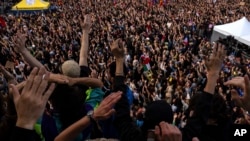Some 30,000 police will be deployed across France late Sunday following the high-stakes runoff of a parliamentary election to ensure there is no trouble, a minister said, as three candidates said they had been victims of attacks on the campaign trail.
Sunday's second round will determine whether Marine Le Pen's far-right National Rally, or RN, secures a parliamentary majority for the first time and forms the next government in France, the euro zone's second-largest economy.
The campaign has been marred by political tensions but also growing violence.
Interior Minister Gerald Darmanin said he would be "very careful" about security on Sunday evening, when the election's results will be announced.
Some 5,000 of the 30,000 police deployed that evening will be in Paris and its surroundings, and they will "ensure that the radical right and radical left do not take advantage of the situation to cause mayhem," he told France 2 TV.
Darmanin said four people had been arrested over an attack that occurred on Wednesday evening on government spokesperson Prisca Thevenot and her team when they were out putting up campaign posters.
While Thevenot herself was not harmed, her deputy and a party activist were injured by an unidentified group of about 10 youths who were defacing campaign posters, Thevenot told Le Parisien newspaper.
An RN candidate in Savoie, Marie Dauchy, also said she had been attacked by a shopkeeper at a market on Wednesday.
Separately, the 77-year-old deputy mayor of a small town near Grenoble, in southeastern France, was punched in the face on Thursday morning when putting up a poster for Olivier Veran, a former spokesperson for President Emmanuel Macron.
Veran denounced a "completely unprecedented context of violence in this campaign."
Meanwhile, a poll on Wednesday suggested efforts by mainstream parties to block the far right from reaching an absolute majority might work.
The Harris Interactive poll for Challenges magazine showed the anti-immigration RN and its allies would get 190 to 220 seats in the 577-strong assembly, while the center-right Republicans, or LR, would win 30 to 50 seats. This could rule out the possibility of a far-right minority government supported by part of the LR parliamentary group.
The poll was published after more than 200 candidates across the political spectrum withdrew their candidacies to clear the path for whoever was best placed to defeat the RN candidate in their district, in a process known as the "republican front."
However, much uncertainty remains, including whether voters will go along with these efforts to block the RN.












